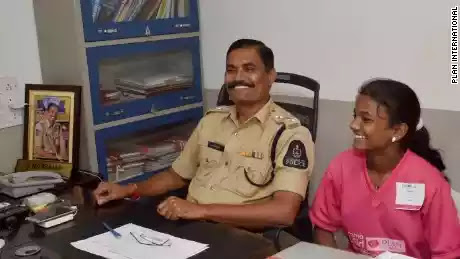Meet the 13-year-old girl who's Chief of Police in India
Bhavani Banu is 13, and for a brief period Monday, was chief of police.
The ninth-grader is focused on identifying problems facing girls in her home nation of India and finding ways to fix them. And on Monday, her efforts were rewarded with a unique opportunity: helming the Musheerabad Police Station in Hyderabad.
During her brief time at the top, the youngest sister of four led a session with officers on a subject close to her heart -- how to handle cases that concern women and girls.
"I wanted to give them some tips," she says.
The ninth-grader is focused on identifying problems facing girls in her home nation of India and finding ways to fix them. And on Monday, her efforts were rewarded with a unique opportunity: helming the Musheerabad Police Station in Hyderabad.
During her brief time at the top, the youngest sister of four led a session with officers on a subject close to her heart -- how to handle cases that concern women and girls.
"I wanted to give them some tips," she says.
"When stopping crimes against girls -- or rescuing them -- the police need to be sensitive," she says.
Bhavani's point is supported by Vijaylakshmi Arora, director of development support at Indian NGO, CRY. She says police have an "insensitivity" in the way they take victim's statements.
The way police handle cases is one of the reasons crimes against girls are not always reported.
"It's not just police -- the entire rehabilitation system needs to be reorientated."
"Many times the police themselves request parents to not file a complaint, citing reasons of stigma."
According to UNICEF, a child goes missing in India every eight minutes, and a number of these children are forced into labor or sold into slavery.
Experts say the pervading silence means most girls are not educated about their rights, which makes them easy targets for these more serious crimes.
"If girls experience violence or harassment, they are often told to stay inside," says says Chhavi Goyal, national coordinator for World Association of Girl Guides and Girl Scouts Global Advocacy Project in India.
"Many girls are vulnerable to slavery and sex trafficking in India because they are not educated about the dangers of it."
School -- not just for boys
The recent shocking and high profile cases of sexual assault and violence against women in India have pushed the way the police handles crimes against females up the agenda -- both domestically and abroad.
Yet of the 95 members of staff under Bhavani's temporary care, only six police officers were female.
If a girl cannot exercise her right to education, what purpose is there to her life?
"I wanted to show that there is a requirement for women in such work places," says the teenager.
"Girls are still stopped from going to school. This mentality has to change and it has to change fast."
Experts say girls leave school, firstly, because of the expectation they will learn how to manage the household, and, secondly, because they get married.
"If a girl cannot exercise her right to education, what purpose is there to her life?" says Bhavani.
However the issue is "deep-rooted, says Choyal. She says women are not considered as the gender that can contribute to the economic growth of the nation.
"In some parts of India, women are considered the 'weaker' section of society," she says. "Families also might feel it is safer for a girl to be married, rather than educated, as she is less likely to face harassment."
She says families could also think their daughters might be too old to get married by the time she finishes her education.
Shocking statistics on domestic abuse perceptions
Shocking statistics on domestic abuse perceptions
According to UNICEF, just under one third of female adolescents between 2000 and 2012 were married or in a union, compared to only 4.6% of males.
And shockingly, during the same period, the organization also says over 50% of men and women considered a husband justified in hitting or beating his wife.
Many of these issues, such as violence and early marriage, are deeply rooted not just in India, but across the world, says Goyal. And education and self esteem are key.
"The biggest challenge lies in the fact that most girls do not see themselves as individuals with self worth and capabilities," says Arora from CRY. She says they see themselves as lesser than boys, and more vulnerable.
"If the girls are given an opportunity -- and equipped with the life skills -- to overcome this notion about themselves we would have taken a significant step."
On Tuesday, Bhavani -- who says her experience of being in charge of so many men left her feeling "very powerful" -- may have taken a first significant step of her own.
"It was an exhilarating experience to know that in that position, I could actually make a difference."






Comments
Post a Comment